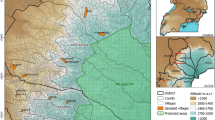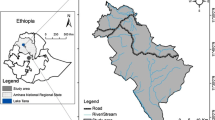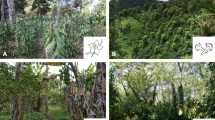Abstract
The case of an agroforestry farm in the coastal mountain area of the federal state of Bahia, Brazil, is used to highlight benefits of the integration of traditional knowledge into a scientifically based farming system. Special attention is given to the selection, combination and management of the crops cultivated. Working hypotheses on the rationale of some major measures are suggested and discussed from a synecological point of view. The results show that under the site conditions the ‘forest garden’ provides cocoa yields without external inputs at a level which, in the surrounding cocoa plantations, can only be attained by the use of considerable amounts of fertilizer and pesticides.
Similar content being viewed by others
References
Alcorn J (1981) Huastic noncrop resource management: Implications for perhistoric rain forest management. Human Ecology 9(4): 395–417
Alvim R and Nair PKR (1986) Combination of cocoa with other plantation crops: an agroforestry system in southeast Bahia, Brazil. Agroforestry Systems 4: 3–15
Beer J (1988) Litter production and nutrient cycling in coffee (Coffea arabica) or cocoa (Theobroma cocoa) plantations with shade trees. Agroforestry Systems 7: 103–114
Ellenberg H (1986) Vegetation Miteleuropas mit den Alpen in ökologischer Sicht. Ulmer Verlag, Stuttgart
Gomez-Pompa A and Jiminez-Avila (1982) Estudios ecológicos en el Agroecosistema Cafetalero. Mexico, CECSA-INIREB
Gomez-Pompa A and Kaus A (1990) Traditional management of tropical forest in Mexico. In: Anderson AB, ed, Alternatives to Deforestation, pp 45–63. Columbia University Press, New York
Posey DA (1985) Indigenous management of tropical forest ecosystems: the case of the Kayapo Indians of the Brazilian Amazon. Agroforestry Systems 3: 139–157
Posey DA, Frechione J, Eddins J and Silva LF (1984) Ethnoecology as applied anthropology in Amazonian development. Human Organization 43(2): 95–107
Rice EL and Pancholy SK (1972) Inhibition of nitrification by climax ecosystems. Am J Bot 59: 1033
Rice EL and Pancholy SK (1973) Inhibition of nitrification by climax ecosystems. II. Additional evidence and possible role of tannins. Am J Bot 60: 691
Walter H and Lieth H (1960) Klimadiagramm Weltatlas. VEB G.Fischer Verlag, Jena
Author information
Authors and Affiliations
Rights and permissions
About this article
Cite this article
Schulz, B., Becker, B. & Götsch, E. Indigenous knowledge in a ‘modern’ sustainable agroforestry system—a case study from eastern Brazil. Agroforest Syst 25, 59–69 (1994). https://doi.org/10.1007/BF00705706
Issue Date:
DOI: https://doi.org/10.1007/BF00705706




